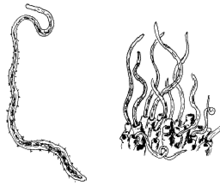- Tubifex tubifex
-
Tubifex tubifex 
Scientific classification Kingdom: Animalia Phylum: Annelida Class: Clitellata Order: Oligochaeta Family: Tubificidae Genus: Tubifex Species: T. tubifex Binomial name Tubifex tubifex
(Johannes Muller, 1774)
Tubifex tubifex, also called the sludge worm, or sewage worm, is a species of tubificid segmented worm that inhabits the sediments of lakes and rivers on several continents. Tubifex probably includes several species, but distinguishing between them is difficult because the reproductive organs, commonly used in species identification, are resorbed after mating, and because the external characteristics of the worm vary with changes in salinity. These worms ingest sediments, selectively digest bacteria, and absorb molecules through the body wall.The worms can survive with little oxygen by waving hemoglobin rich tail-ends to exploit all available oxygen, and can exchange carbon dioxide and oxygen through their thin skin, as with frogs. They can also survive in areas heavily polluted with organic matter that almost no other species can endure. By forming a protective cyst and lowering its metabolic rate, T. tubifex can survive drought and food shortage. Encystment may also function in the dispersal of the worm. [1]
They usually inhabit the bottom sediments of lakes, rivers, and occasionally sewer lines and outlets.[2]
References
- ^ "Video clip of encysted Tubifex tubifex". http://www.youtube.com/watch?v=LwvBfBCsg-Q.
- ^ Dukes, Tyler (2009-07-01). "Raleigh 'sewer creature' surprises city officials". news14.com. http://www.news14.com/content/local_news/triangle/611427/raleigh--sewer-creature--surprises-city-officials/Default.aspx. Retrieved 2009-07-02.
Lake zones Littoral zone Limnetic zone Profundal zone Benthic zone Lake stratification Epilimnion Metalimnion Hypolimnion Destratification Lake types Holomictic lake Monomictic lake Dimictic lake Polymictic lake Meromictic lake Amictic lake Aquatic ecosystems Wild fisheries Categories:- Haplotaxida
- Animals described in 1774
Wikimedia Foundation. 2010.

